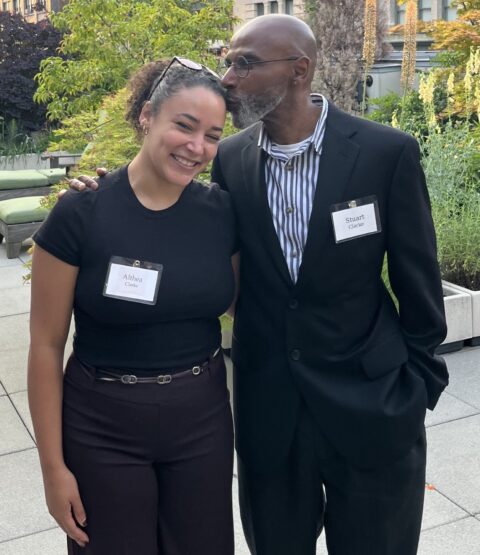
At a time that is crucial to equitable climate and clean energy progress, we are fortunate to have Stuart Clarke serving as Chair of the U.S. Energy Foundation (EF) Board of Directors.
Stuart grew up in the nation’s biggest, busiest city, and unexpectedly walked into the world of environmentalism, climate, and clean energy via a job that introduced him to wilderness. He currently serves as Director of the Environment and Public Space program at the William Penn Foundation in Philadelphia. We got to know him when he was Executive Director of the Town Creek Foundation, where his work included advancing clean energy transformations in Maryland.
I hope you will enjoy learning more about Stuart’s leadership and his faith in a healthy, prosperous, and equitable clean energy future.
– Jason Mark, CEO, U.S. Energy Foundation
Your experiences working in Atlanta for the North Carolina Outward Bound School, and in managing environmental grantmaking for the William Penn Foundation in Philadelphia reflect an interest in the great outdoors and the intersection of humanity and nature. How do these experiences inform your interest in climate?
Somewhat surprisingly, my work with Outward Bound put me on the path where I would ultimately become engaged with climate. I didn’t have any particular interest in or experience with environmental issues prior to working with Outward Bound, just as I didn’t have any real experience in the wilderness. I grew up in Jamaica, Queens, in New York City, and I was very much a city kid with no significant experience in nature. While working with Outward Bound, I helped establish an environmental service corps that combined wilderness experience and environmental service work. We recruited teams of young people, used experience in the wilderness as a team-building and personal growth opportunity, and then deployed them to do service work in and around Atlanta. Our work was funded by the Turner Foundation, then led by Peter Bahouth, former Executive Director of Greenpeace. Ultimately Peter hired me to manage Turner’s grantmaking on water and toxics. So my work with Outward Bound put me on the path toward advocacy and philanthropy. Had it not been for that experience, I wouldn’t be where I am today.
You also were Chief Operating Officer of Hands On Network, a national network of community-based centers for volunteerism and civic action. What role do community and community-based organizations play in EF’s mission?
They play a critical role! I am so proud of the way that EF sees communities and community-based organizations as a critical constituency for whom the work is being done. I also greatly respect the way that EF honors community-based leadership. That is extremely important to me and my colleagues on the board.
What are some of the priorities you will carry forward from previous EF board chairs, and what are some new ones you’re thinking about?
Ideally, every chair will carry forward from their predecessor the priority of ensuring that the board is effectively executing its governance responsibilities, and is doing so in a way that is ever mindful of the important distinction between diligent oversight and meddling in management prerogatives. Nicole Systrom (our previous chair) worked very hard and well to ensure the board was undertaking its responsibilities efficiently and without overstepping. Nicole handed me the reins with that part of the work in great shape—and it’s my responsibility not to screw it up. New priorities? First, my board colleagues and I are thinking a lot about establishing and sustaining the appropriate positioning of EF within this evolving climate philanthropy landscape. We want to help [CEO Jason Mark] and staff make sure that EF’s value proposition is clear and effectively communicated as the landscape continues to change rapidly. Also, the foundation has carved out a leadership role around incorporating a focus on equity into climate work, and we think a lot about maintaining and strengthening that focus, even as pressures to rescind and retrench grow.
Finally, something I think a lot about is how to help the board be as self-reflective as possible about our own effectiveness—about what we’re doing well, and where there are opportunities for us to strengthen our performance. A bit of a priority for me is elevating and institutionalizing that kind of reflection.
Are there areas of progress in the work of EF and its grantees that especially excite you?
The state-level victories are always very exciting and inspiring to learn about. At several board meetings, we have had the opportunity to hear directly from grantees about the work they are doing, as well as from EF staff who are place-based. The progress that has been made in the staff’s strategy development—and in the communication of their strategies—also is quite exciting for us. It’s so important for us to come out of a board meeting feeling like we have a clear understanding of EF’s strategies and a good grasp of how the staff thinks our goals are going to be achieved. The sharpened focus on communications and the resources that Jane (Breyer, Senior Vice President, Strategic Partnerships) and her team have been able to secure to support comms work is tremendously exciting as well. We realize how critical comms is to achieving longer-term goals.
What do you appreciate about the current EF board?
The people! It’s a remarkable collection of smart, accomplished, experienced, humble, and fun individuals. The people make it special. The fact that the board brings together so many different kinds of value: judgment, expertise, experience, and an ability and eagerness to work together in an exceptionally collegial manner. Everyone really leaves their ego at the door and it makes our board meetings a truly joyful experience. It’s a relatively small board, which creates opportunities for us to feel connected to one another.
What gives you hope that your daughter will see a healthy, prosperous, and equitable clean energy future?
I don’t know that I would use the word “hope.” I’m more attracted to “faith” than hope. To me “faith” feels more stable and grounded than “hope.” One thing that gives me faith is that I have the great privilege of sitting in seats like Chair of the EF board, where I have a front row seat to the work and talent and heart and muscle that is being deployed to help bring about that future. I see, I hear, I feel the enormous effort, intelligence, and investment that the tremendously talented and powerful EF staff is making in trying to ensure that my daughter can have that future. I see it at EF, (and also at Earthjustice ,whose board I am also honored to chair) and I’ve had the blessing of a career of being able to see and help support tremendously effective and inspiring activists and advocates.
That’s what gives me faith—the quality of the effort being made by extraordinary people to bring that future about. Some days my faith falters, but then I come to a board meeting and hear the powerful reports about the work, or the compelling articulation of a strategy, and my faith is renewed.
How can philanthropy have the biggest impact today?
Speed—as an accelerator; clocks are ticking, windows are closing, and philanthropy needs to be focused on accelerating progress, and that means moving money rapidly, helping to scale the right things at the right pace. That’s an important part of it. And the biggest impact today—as always—is smart risk-taking, being willing to bet, and to make significant bets on less-than-certain projects and missions. One of the great advantages of philanthropy is the capacity to take risks and manage risks.
As the clock keeps ticking, philanthropy becomes more important—and potentially more impactful.
